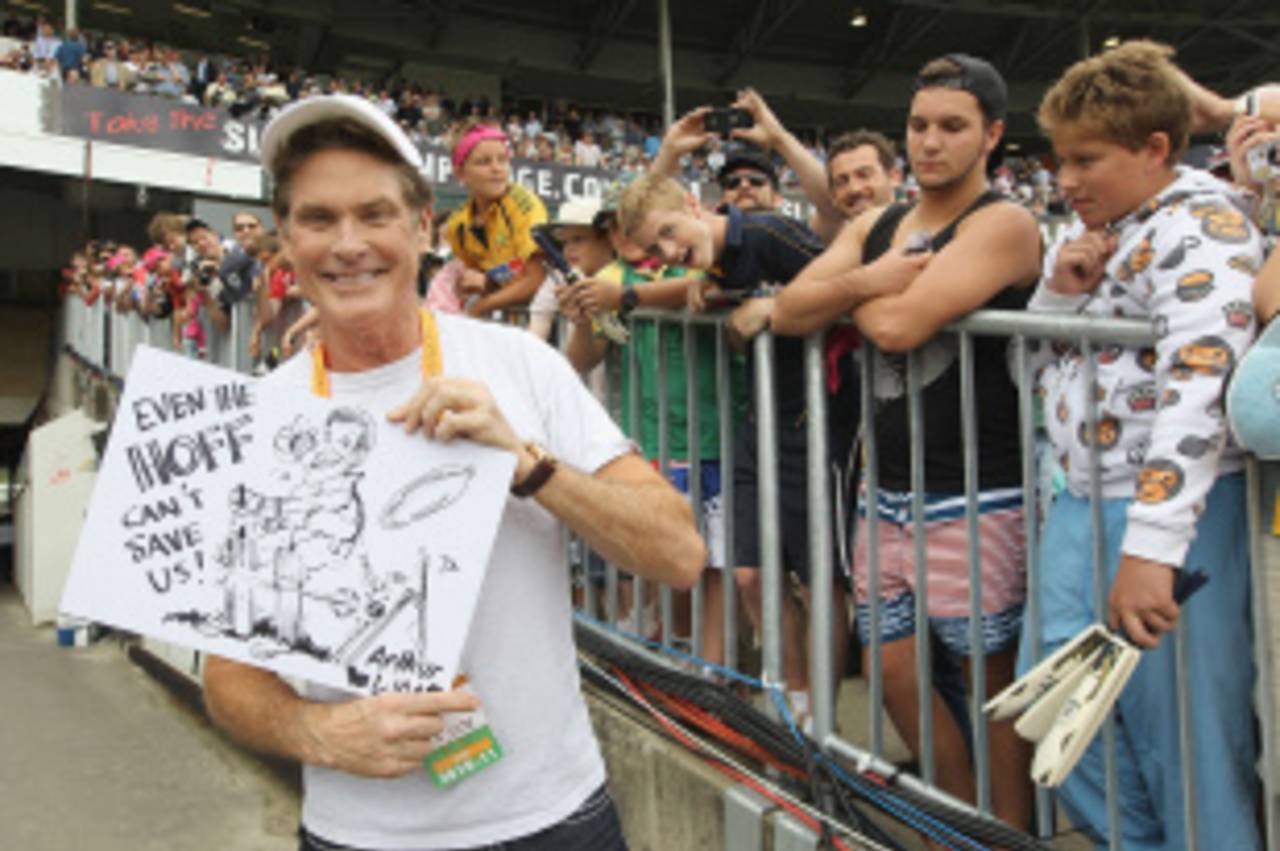The world moves in apt and mysterious ways, and so it was that on Michael Clarke’s first afternoon as Australia’s captain in the field David Hasselhoff was sitting in the crowd. Hasselhoff is a world-renowned TV lifeguard and crime fighter who used to get around in a talking, thinking, rocket-powered car named KITT. Which made The Hoff’s presence at the SCG doubly apt. For what comes higher on any new captain’s wishlist than a car capable of telling you what to do and then zooming you the heck out of there should things go awry?
Seven balls into England’s innings, the dog days of Ponting were over and the Pup Era upon us. That’s when Clarke tossed Mitchell Johnson the new ball. Ponting’s preference had been to hold Johnson back till after the drinks break. But for Clarke, Johnson immediately made that seventh ball wobble, and Clarke, in appreciation, clapped hands above his head at second slip. Second slip was where another glamour bat, Kim Hughes, had posted himself on his first day as captain 32 summers ago. Hughes promptly dropped Javed Miandad, twice – sitters, both – and Javed freewheeled along to 129.
The good news for Clarke today was that he spilled no catch. The bad news was that no bowler looked likely to give him one.
Clarke’s first field setting was an odd mixture of aggression and dunderheadedness: a short leg (albeit standing too square), three slips (albeit standing on each other’s toes, so that they were effectively two-and-a-bit slips) and a gully. Handing Johnson the new cherry, as captaincy moves go, ranked somewhere between sensible and inspired. For Johnson had that very morning heaved 53 runs, and on days where he hits 40 or more with the bat and then has a trundle, Johnson’s Test bowling average stands at 10.86. Today was not one of those days when Johnson is a 10.86 kind of bowler. He was too easily cuttable and pullable, so Clarke hauled him off after three overs. Ben Hilfenhaus, ditto, was dragged after five. These interventions of Clarke’s felt decisive, not panicky.
Later, Hilfenhaus came back. After a quick word with Clarke – prolonged Ponting-style mini-conferences between bowler and captain were now a thing of the past – he switched to around the wicket. He’d been averaging a scalp every 3.5 days, poor honest Hilfenhaus. Now he made a ball slide in, kiss the pitch, straighten up and bend back Andrew Strauss’s off stump.
Positivity, calm control, a shuffling of bowlers, a willingness to experiment, a sense that one man was running the show … This was captaincy evocative not of Ricky Ponting or Kim Hughes but of how Shane Warne might have done things, given the chance. Instead Clarke’s old mucker and mentor was in the Channel 9 commentary box. “I reckon it’s Beer o’clock,” urged Warne when last drinks were taken at 4.31pm. Sure enough, at 4.39pm, for the 31st over of the innings, Clarke called up the mysterious and seldom-spotted left-arm spinner Michael Beer.
So that’s what he looks like, one thought to oneself: a dead ringer for Dirk Tazelaar! Thin of build, and of hair as well, which was sort of straw-coloured, Michael Beer looked older than his 26 years, with a dollop of sunscreen on his nose and a single wrinkle stretched out like a volcanic fault line across his forehead. It was at this ground and this exact juncture – day two, last session, last Test of an Ashes series – that the nation’s last mystery spin selection, Peter Taylor of Northern District Cricket Club, bowled his first ball for Australia. That was in January 1987. Taylor’s first ball was a good-length offering floated up outside off stump. Beer’s was nigh on identical.
There the coincidences ended. Taylor’s floated-up first ball elicited a bottom edge from Allan Lamb’s bat. Beer’s was drilled by Kevin Pietersen to the mid-off fence.
For Beer, this was not so much Boy’s Own as Oh Boy! stuff. His 14th ball – a Cook slog, a skyer to mid-on, a simple catch – brought both a wicket and a flutter of doubt. Foot-fault, Umpire Bowden suspected, and his hunch was right. Beer’s airborne heel was over the front line. Beer’s one Test wicket was, again, none.
And none it remains, as promisingly as he flighted, spun and bounced the ball in the day’s dying overs. Now England are barely a hundred behind. They are only three wickets down with three long days to go. What’s a new captain to do? There are no rules, no real riding instructions. When you become captain they don’t give you a how-to-do-it kit; alas, for Clarke, they don’t give you a KITT either.
Christian Ryan is a writer based in Melbourne. He is the author of Golden Boy: Kim Hughes and the Bad Old Days of Australian Cricket and, most recently Australia: Story of a Cricket Country
